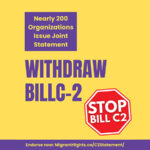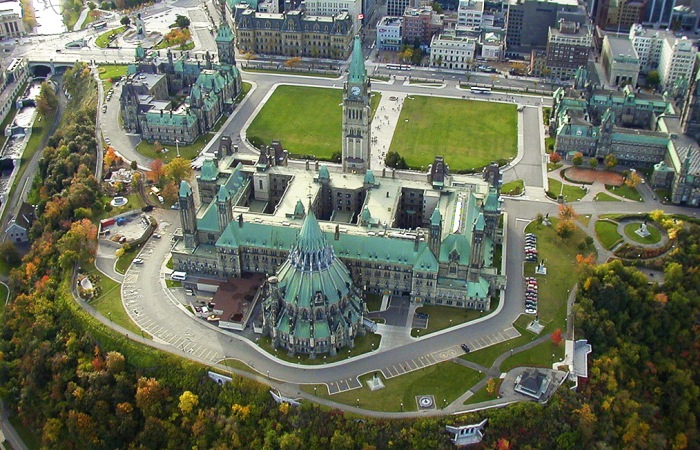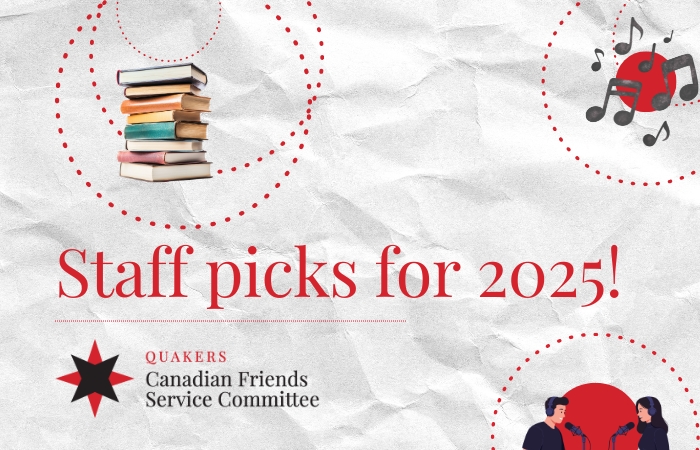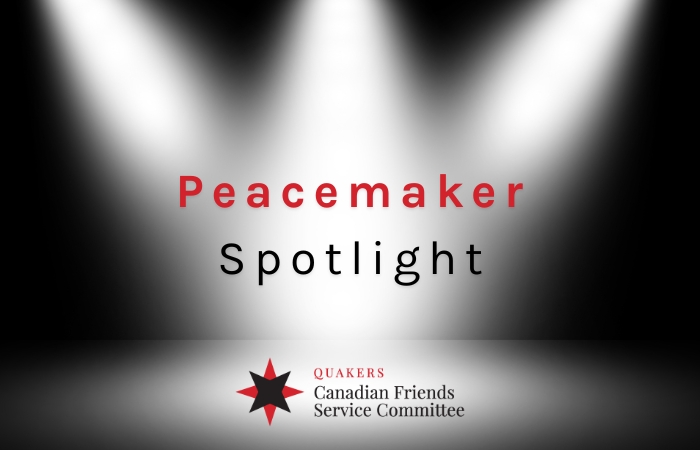
Almost 200 organizations call on Canada to withdraw Bill C-2
June 18, 2025
Coalition for the Human Rights of Indigenous Peoples statements at the UN in Geneva
July 17, 2025

Parliament Hill photo CC-BY Tsai Project.
Dear Prime Minister,
Greetings from Canadian Friends Service Committee (CFSC), the peace and social justice agency of the Religious Society of Friends (Quakers) in Canada.
We wanted to take this moment to congratulate you on your election win and role as Prime Minister of Canada for this 45th session of Parliament. As Prime Minister in a minority government, we are pleased that you have acknowledged the need to work constructively with all parties and lead with humility and in unity with all people in Canada. As you’ve rightly mentioned, since becoming Prime Minister and articulated in the Speech from the Throne, we are living in turbulent times, with growing social and economic divisions, global insecurity, and domestic challenges being front and centre. However, the election made it clear that Canadians sought leadership rooted in something more profound than partisanship. As such, we welcome the message you offer that this Parliament and the new Cabinet will foster collaboration and will engage in respectful, constructive debates, ensuring fair and bold action that will support all people in Canada.
Quakers are seeking transformative change, both within our institutions and in our society, for the common good of all people in Canada. As an organisation, Canadian Friends Service Committee has over 90 years of experience acting through practical assistance, research, education, and non-partisan policy dialogues to achieve change in our three program areas: Indigenous Peoples’ human rights, peace, and transformative justice.
It is within these three areas that CFSC urges your government to take decisive and bold action in the coming months.
Indigenous Peoples’ human rights
CFSC has a long history working in collaboration with Indigenous partners and human rights allies especially during the negotiations that led to the adoption of the UN Declaration on the Rights of Indigenous Peoples by the UN General Assembly in 2007 and the subsequent passage of the Declaration Act and National Action Plan in Canada in 2021 and 2023 respectively. Canada has played, and continues to play, a role on this issue at the UN and internationally. As we continue our work in solidarity with Indigenous Peoples, we welcome your commitment, as stated in the Cabinet mandate letter, to work in true partnership with Indigenous Peoples and the promise that the Government will always be firmly guided by the principle of free, prior, and informed consent when considering nation-building projects.
Recommendations:
As a government committed to reconciliation, we urge action on the following:
- Full implementation of the UN Declaration on the Rights of Indigenous Peoples Act (2021) and Action Plan (2023) with a strategy towards adoption by all provinces and territories in Canada
- Establish an independent and permanent Indigenous Peoples’ human rights monitoring mechanism that is properly funded and Indigenous-led in fulfillment of shared priorities action item 19 of the UN Declaration Act National Action Plan
- Affirm Canada’s unequivocal endorsement of the American Declaration on the Rights of Indigenous Peoples (the American Declaration). As a member of the Organization of American States (OAS), Canada is legally bound by the consensus decision made by the OAS General Assembly to adopt the American Declaration
- Full implementation of the Calls to Justice from the National Inquiry into Missing and Murdered Indigenous Women and Girls (MMIWG)
- Complete the remaining Calls to Action of the Truth and Reconciliation Commission’s Final Report as this year marks the 10th anniversary of the report’s release
Follow through on these actions would be the best way to demonstrate meaningful progress towards reconciliation and nation-to-nation relationship building—an important investment in building a strong and unified Canada.
Peace
Canada has long been recognized for its leadership in peacekeeping, diplomacy, and commitment to international law and human rights. However, in recent years, this role has diminished. The current government was elected partly due to public hope that it would restore Canada’s global leadership, especially amid growing international instability. The government’s stated intention to make Canada “a force for peace in the world” is encouraging, but this must be matched by action that aligns with Canadian values and priorities, including by meeting our obligations at the United Nations and all treaties, conventions, and agreements that we have adopted and ratified, as well as the International Criminal Court and the International Court of Justice.
Security is more than weapons, military responses, and perceived commitments and/or threats. It is about people, peace, and human rights both within Canada and globally. Massive increases in defense spending—including a 2% GDP target, $61 billion toward a ‘golden dome’ U.S. missile defense system, and $27+ billion for F-35 jets—raise concerns about affordability, especially with no clear tax strategy or wealth taxation to support them. These costs could undermine fiscal commitments, including priority seven of the Cabinet mandate: “spend less on government operations so Canadians can invest more in people and businesses.”
Recommendations:
Reframe national security to include social and human security. NATO explicitly permits peacekeeping and humanitarian expenditures as part of defense commitments. Invest strategically in:
- Foreign aid, development, and international peacebuilding and diplomacy via multilateral institutions (UN, ICC, ICJ).
- Sustainable domestic programs that contribute to long-term stability: public service infrastructure, healthcare, education, restorative justice and reconciliation with Indigenous Peoples.
- Climate-resilient infrastructure and green jobs that enhance national resilience.
Sound policymaking requires robust parliamentary scrutiny. Fast-tracked legislation often leads to legal and financial repercussions, including charter challenges. To ensure effective, accountable governance we urge you to uphold legislative due process with expert input from civil society and public service professionals.
Transformative justice
Quakers have a long-standing commitment to justice transformation. In Canada, CFSC advocates for approaches that reduce harm and improve outcomes, especially for those affected by the legal system. The current carceral system is expensive and ineffective at reducing crime. Poverty is the strongest predictor of incarceration, and re-entry into society is often obstructed by systemic barriers such as lack of income and housing. “Tough on crime” policies have proven costly and ineffective.
Recommendations:
- A federal-provincial demonstration project in Prince Edward Island would offer a cost-effective model to test Guaranteed Livable Basic Income (GLBI) outcomes.
- GLBI prevents crime at the source by addressing poverty, reducing contact with the legal system, and supporting reintegration post-incarceration.
- A well-supported Federal Framework to Reduce Recidivism (FFRR) will reduce repeat offenses and incarceration costs, freeing resources for more productive social investments.
- The upcoming progress report in August provides a timely opportunity to assess and enhance this initiative.
- Policies must be based on rigorous research and consultations with community-based organizations and justice experts.
- Irvin Waller’s research demonstrates that reallocating 5% of criminal justice spending to social supports—such as youth programs, family services, and mental health—can reduce violent crime by 50%.
- Invest in Indigenous-led justice approaches and restorative justice, which have shown high satisfaction rates and effective conflict resolution outcomes that lead to reduced recidivism
- These models align with the government’s reconciliation commitments and offer community-centered alternatives to incarceration. Indeed, increased funding and access to Indigenous led Healing Lodges is needed.
Efficiency, productivity, and safety is what people are looking for. Canada has the tools and expertise to deliver on this, especially when government and civil society come together. The justice system needs transformative change, not just reform. It is time for smart policies that deliver on that promise.
Now is a critical moment for Canada to reaffirm its identity as a leader in peace and justice. Through smart, evidence-based policies and close collaboration between government and civil society, Canada can promote both domestic well-being and global peace. These priorities are not in conflict with fiscal responsibility—they are pathways to smarter, more cost-effective governance. The new Parliamentary session presents a timely opportunity to embrace transformative change—focusing not on militarization and reactive policies, but on proactive diplomacy, justice, and investment in people and communities. This vision reflects peoples desire for a country that leads with integrity, compassion, and long-term foresight.
Our team is happy to meet with you on any of these issues, and look forward to helping you, the government and all Parliamentarians to take on the task of building a stronger society—one where all people are respected, supported and have their rights protected.
Download this open letter in PDF.




